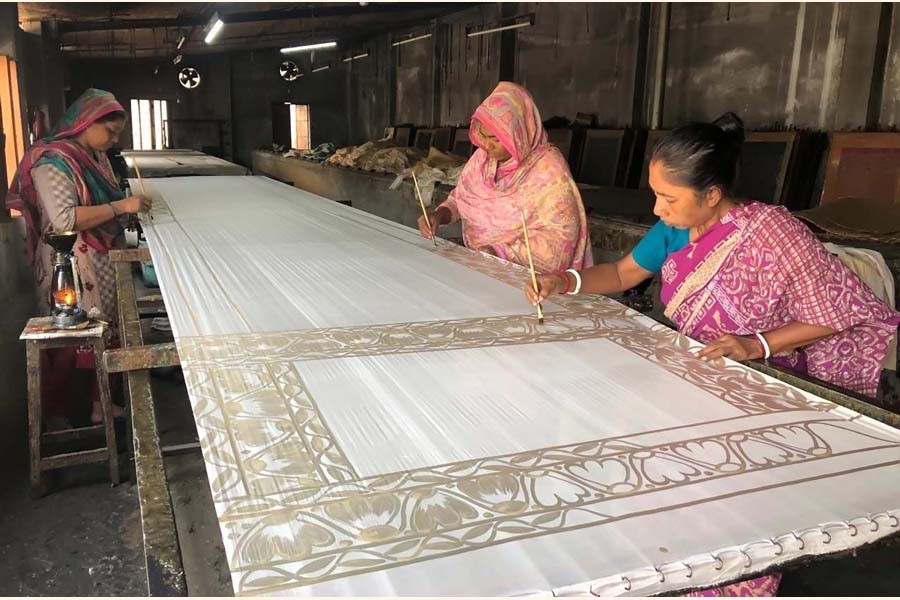Rajshahi Silk Para bustling with Eid shoppers
Artisans, traders expect a turnover of Tk 600 million

Published :
Updated :

Like every Eid, Silk Para in Rajshahi is drawing an overwhelming crowd of shoppers as the festival is at hand.
The factories and showrooms in Silk Para are now passing an unusually busy time.
Targeting the Eid sale bonanza, the industry insiders, including the businessmen, are expecting a turnover of about Tk600 million (Tk 60 crore).
Buyers are coming from various places including Rajshahi city to buy the clothes of their choice. Besides, the arrival of wholesale traders has also been good this time.
It is learnt, most of the country's silk products or silk yarn are produced in Rajshahi.
The headquarters of Bangladesh Silk Development Board is also in Rajshahi. But Rajshahi silk industry has been struggling to revive its lost glory for a long time.
However, Rajshahi silk has been developed under private initiatives. As a result, different types of silk clothes suitable for all ages and classes are being produced in various factories of Rajshahi.
Sapura area under Bangladesh Small and Cottage Industries Corporation (BSCIC) of Rajshahi is called Silk Para.
Sapura is home to several showrooms including Sapura Silk, Usha Silk, Amena Silk, Rajshahi Silk.
These silk showrooms enjoy sale bonanza during Eid and Bengali New Year.
Visiting Silk Para recently, this correspondent found that the artisans were cutting yarn from the silk bales and weaving clothes by using machine.
Later artisans are making different designs on those clothes. Puthi and Chumki are being installed.
As a result, entire Silk Para of Rajshahi metropolis has become busy with weaving, dyeing and handicraft works.
Samrat Ali, an artisan of Rajshahi silk, said that the work pressure was also high because of the relatively high sales in the showrooms this time.
But saree, three-piece and punjabi works have to be done more. Besides, other contents are also being made.
Geetha Rani and Moushumi Biswas, artisans of Amana Silk, said that sale has increased because Eid and Bengali New Year are together.
"Due to these festivals, we are designing different types of clothes including sarees, three-pieces, punjabis. We eight people are working 7/24 in three shifts due to the high workload," said Geetha.
Silk showrooms are decked up in clothes. As Eid is approaching, customers have started crowding these showrooms. Buyers are also buying silk sarees, punjabis, three-pieces and other products of ever-new designs and rich colours.
However, many buyers have expressed their resentment as prices have increased this time compared to last Eid.
Traders said that due to increase in the prices of imported yarn and dyes, prices of clothes have increased slightly.
In the private-owned silk showrooms of Rajshahi, silk sarees are priced at between Tk2,000 and Tk15,000 each, shirts between Tk550 and Tk3,500 each, punjabi between Tk1,200 and Tk25,000 each, three-pieces between Tk1,200 and Tk 17,000 each and hijab, veil or scarf are available for Tk750 to Tk 7,000 each.
Only two types of sarees are available in the showrooms of the state-owned silk factories.
Print sarees cost Tk5,500 each while garad cloth sarees are priced at Tk 8,500 each.
A private university teacher named Sharmin Akhtar Sapna came to buy Eid clothes at Amena Silk showroom.
She said, "I always like silk sarees. I have come to buy a saree again. There is more innovation in sarees this time. Different designs of sarees have also arrived in the showrooms. But the price is high."
Saidur Rahman, manager of Sapura Silk, said, "As Eid is approaching, the rush of buyers has started. Eid sale this time is quite good compared to last few years."
Md Liaquat Ali, president of Rajshahi Silk Owners Association, said that sales were increasing ahead of the Eid festival.
This Eid, silk traders will do a business of around Tk500 million (Tk50 crore) to Tk600 million (Tk60 crore) in Rajshahi alone, he added.
anaetru@gmail.com


 For all latest news, follow The Financial Express Google News channel.
For all latest news, follow The Financial Express Google News channel.